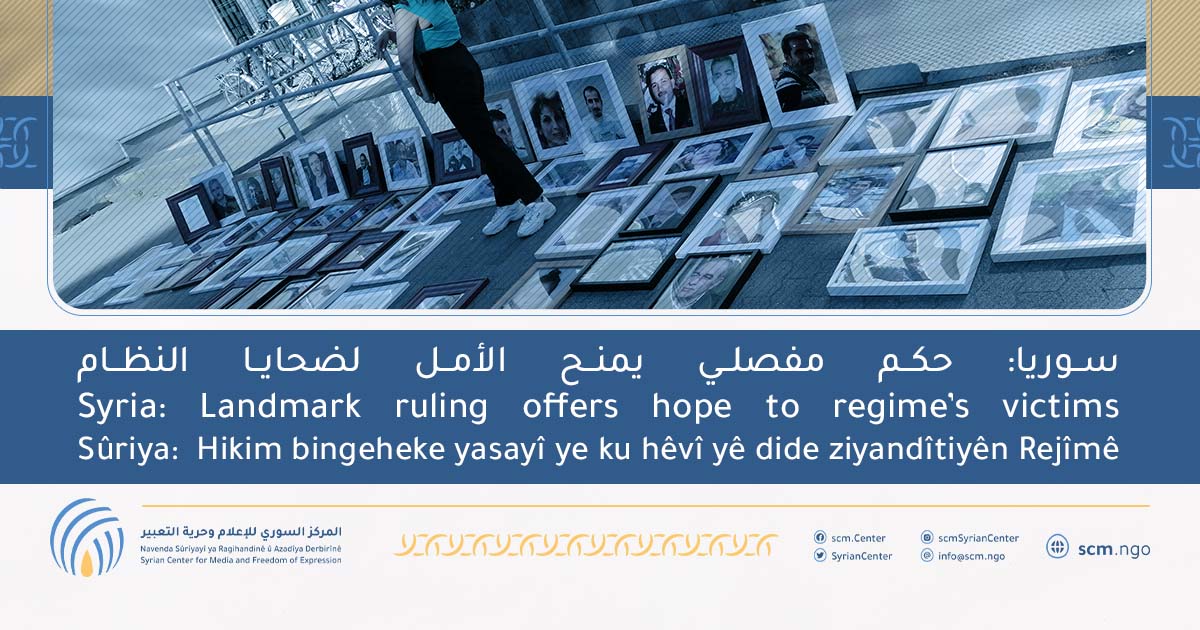The 1st criminal division – State Security Division – of Koblenz Higher Regional Court has sentenced the 58 year-old Syrian national, Anwar R. to life imprisonment today after convicting him of having committed a crime against humanity in the form of killing, torture, serious unlawful detention, rape and sexual assault in a unity of crime with murder in 27 cases, grievous bodily harm in 25 cases, especially grievous rape and sexual assault in two cases, false imprisonment lasting one week in 14 cases, the taking of hostages in two cases and the sexual abuse of prisoners in three cases.
After considering the evidence, the division regarded it as having been proven that the defendant Anwar R. was a co-offender in a protracted and systematic attack that was launched against the civil population of Syria, resulting in 27 people being murdered and 4,000 others having their physical freedom impaired in a serious manner, they also having been subjected to torture during their times in prison.
Protracted and systematic attack against the civil population of Syria:
According to the findings of the division, The Syrian regime had been launching a protracted and systematic attack against its own civil population at least since the end of April 2011.
What was referred to as the “Arab Spring” flowed over into Syria at the beginning of 2011. A “Central Office for Crisis Management” was established when the protests spread. The committee was subordinate to the State President Bashar al-Assad, and it gave all the security forces orders regarding the action that was to be taken against the protest movement. lt was the objective of the resolutions that were adopted by the Central Office for Crisis Management to subdue the protests come what may by force of arms if necessary, with the aim of stabilizing the Government. The participants in demonstrations or rallies were to be stopped from becoming involved in further activities and the overall population was to be deterred from participating in protests. Great numbers of real or presumed regime opponents were arrested on a daily basis, they then having been taken to secret service prisons, including that of Section 251 of the Syrian secret service that was located in Damascus. The prisoners were locked up here, mistreated and tortured without access to legal proceedings.
The violence was not perpetrated in an isolated and random manner, but within the scope of a comprehensive strategy that was exercised by the regime. lt was the intention to make the Syrian population submissive.
The division evaluated this attack against the Syrian population as not only having been systematic in quantitative terms, but also in qualitative terms.
Offences and joint offences committed by the defendant in the Section 251 prison:
The findings of the division were that between the end of April 2011 and the beginning of September 2012, at least 4000 prisoners were held in the prison that was annexed to the interrogation subdepartment that was a part of Section 251 of the Syrian general secret service. During interrogation, the prisoners were brutally tortured in various ways including them being hit with cables or sticks, being kicked and the use of electric shocks. The prisoners were also demeaned and humiliated by sexual violence also being used. The prisoners were also subjected to mistreatment by the prison staff outside the interrogations, in addition to them being kept in the overcrowded prisons under inhuman and humiliating prison conditions. Not only did they have to suffer violence themselves, they were also subjected to the permanently audible cries of pain from the fellow prisoners that were being tortured. lt was also impossible at times for the prisoners to sleep in the extremely overcrowded prison. No medical care was provided and the food that was served was inadequate and often inedible.
27 imprisoned persons died between the end of April 2011 and the end of September 2012 as a result of the torture, other mistreatment or the prison conditions. As far as the role played by the defendant was concerned, the senate has determined the findings that he was a member of the Syrian general secret service and that he held a high position within it.
He was responsible for the lnterrogation Department of Section 251 of the general secret service that was responsible for the Damascus area – this also being designated as being the Al-Khatib Department. ln this function, the defendant was also responsible for the prison that was connected to the Interrogation Department.
As the head of the lnterrogation Department, the defendant was responsible for what happened at the prison during the period of April 2011 and September 2012, this being the period during which the crimes were committed. He monitored the events in the prison, in addition to him also decisively determining them and therefore having control of their perpetration. Despite the fact that the defendant did not commit the offences in person, they are to be attributed to him as a result of his decision-making and command.
The division has therefore convicted the defendant as a co-offender on these grounds.
Murder from base motives:
27 people died in Al-Kathib prison as a result of the mistreatment that occurred during the period during which the offences were committed. The division deems the characteristic feature of murder from base motives as existing as far as the person of the defendant is concerned. While serving the Syrian secret service, the defendant wanted to combat peaceful political opponents, even including their physical destruction. lt was the aim of this combat to prevent the overthrow of the totalitarian regime. The defendant also wanted to retain his highly regarded social position as an colonel in the general secret service and the privileges that go with it. The division deemed this to be the base motives.
No necessity of defence:
It was the opinion of the defence that the defendant could not be held accountable for his crime on the grounds of the existence of a necessity of defence (Section 35 of the German penal code StGB).
A leaving of his position and a turning away from the Syrian regime would have been lifethreatening for him and his family as he would have to fear the revenge of the regime.
The division has negated the existence of a necessity of defence, however. lt has established that the defendant fled from Syria in December 2012, but the division is convinced that the defendant would have been able to leave Syria much earlier. ln view of the severe nature of the crimes that have been committed, it could reasonably have been expected of the defendant that he withdraw from these crimes, even if he should have to take personal risks.
Basis for the determination of the facts of the case by the division:
The division made its determinations on the basis of the statements that were made by more than 80 witnesses, including numerous expert witnesses and witnesses from abroad, the information provided by experts and the collected documentary and visual evidence, including a selection of photographs from what is referred to as the “Caesar File” – the division being convinced that these were photographs that were taken by a former Syrian military photographer – that were seen by the division and forensically evaluated by an expert. Not only were documents included in the proceedings, but also reports from international organizations and human rights organizations.
Sentence and establishing of the special strength of guilt:
The legislator has stipulated a compulsory life sentence both for murder and for crimes defined under Section 7 subsection 1, No. 1 of the German Code of Crimes against International Law (Völkerstrafgesetzbuch, in short VStGB). The division has also passed a corresponding sentence.
The division has not established the special strength of the guilt, however. The division came to this decision after it had carried out a comprehensive weighing-up of the facts.
Its considerations also included the fact that the crimes were committed ten years ago, that the defendant did not use any violence himself and that he only had conditional intent with regard to the killings. He has also broken away from the regime.
This means that a determination can be made after a period of 15 years, as to whether the life sentence can be suspended on probation.
Jurisdiction of Koblenz Higher Regional Court:
What is referred to as the principle of universal jurisdiction provides for a global prosecution of criminal offences, irrespective of the place of the crime and the nationality of the offenders and the victims. lt is based on the consideration that the prosecution of core international crimes in the interest of mankind. The principal of universaljurisdiction has been included in Section 1, clause 1of the German lnternational penal code. This provision provides grounds for the jurisdiction of German courts for crimes against humanity, even if such have been committed abroad and there is no connection with Germany.
The Jurisdiction of the State Security Division at Koblenz Higher Regional Court is substantiated by Sects. 13 subsections 1, 8, 9 of the German code of criminal procedure (StPO) in conjunction with Section 120 subsection 1, No. 8 of the German Judiciary Act (GVG). The former co-defendant Eyad A. resided and was arrested in Zweibrücken, so that in conformity with the aforementioned regulations, Koblenz Higher Regional Court also has jurisdiction with regard to the defendant Anwar R.
The criminal proceedings against Eyad A. have been separated and are being continued with under file reference 1 StE 3/21. The state security division of Koblenz Higher Regional Court passed sentence in these proceedings on 24 February 2021, but this is not final and conclusive (please refer to the press release issued by Koblenz Higher Regional Court on 24 February 2021).
Decisive provisions (extracts):
Section 1 clause1 VStGB:
This Act shall apply to all criminal offences against international law designated under this Act, to offences pursuant to sections 5 to 12 even when the offence was committed abroad and bears no relation to Germany.
Section 7 VStGB: Crimes against humanitv
Subsection 1
Whoever, as part of a widespread or systematic attack directed against any civilian population,
1. kills a person,
…
5. tortures a person in his or her custody or otherwise under his or her control by causing that person substantial physical or mental harm or suffering where such harm or suffering does not arise only from sanctions that are compatible with international law,
6. sexually coerces, rapes, forces into prostitution or deprives a person of his or her reproductive capacity, or confines a woman forcibly made pregnant with the intent of affecting the ethnic composition of any population,
…
9. severely deprives, in contravention of a general rule of international law, a person of his or her physical liberty,
…
shall be punished, in the cases referred to under numbers 1 and 2, with imprisonment for life, in the cases referred to under numbers 3 to 7 , with imprisonment for not less than five years, and, in the cases referred to under numbers 8 to 10, with imprisonment for not less than three years.
Section 211 of the German penal code (StGB)
Subsection 1
The murder shall incur a penalty of imprisonment for life.
Subsection 2
A murderer is someone who kills a person
out of a lust to kill, to obtain sexual gratification, out of greed or otherwise base motives,
…
Section 177 StGB in the version from 13 November 1998
Subsection 1
Whoever, against a person’s discernible will,
1. by use of violence,
2. by making immediate threats to life or limb, or
3. makes use of a situation in which the victim is not protected against the actions of the perpetrator, performs sexual acts on that person or has that person perform sexual acts on them, or causes that person to perform or acquiesce to sexual acts being performed on or by a third person shall be sentenced to a minimum prison sentence of one year.
Subsection 2
ln especially serious cases, the penalty is imprisonment for a term of at least two years. An especially serious case typically occurs where
1. the offender has sexual intercourse with the victim or has the victim have sexual intercourse or commits such similar sexual acts on the victim or has the victim commit them on them which are particularly degrading for the victim, especially if they involve penetration of the body (rape), or
2. the offence is committed jointly by more than one person.
Subsection 3
The penalty is imprisonment for a term of at least three years if the offender
1. carries a weapon or other dangerous implement,
2. otherwise carries an instrument or other means for the purpose of preventing or overcoming the resistance of another person by force or threat of force or
3. places the victim at risk of serious damage to health.
Section 25 StGB
Subsection 2
lf several persons commit an offence jointly, each person receives a penalty as an offender (joint offenders).
https://justiz.rlp.de/de/service-informationen/aktuelles/detail/news/News/detail/life-imprisonment-due-to-crimes-committed-against-humanity-and-murder-sentencing-of-a-suspected-me/





